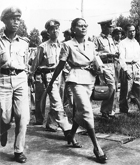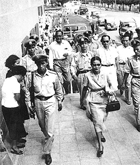| |
Were Thanpuying Poonsuk Banomyong to have lived to 2 January 2008, she would have completed her 8th cycle; that is, she would have been 96 years old. All of us who held her in great esteem had hoped she would live even longer and continue to serve in her role as an important moral compass. Among our contemporaries, it is impossible to find someone like her. She deftly blended traditional notions of femininity with modern values associated with meaningful democracy. She stood with the marginalized and steadfastly upheld the principles of truthfulness and non-violence. She was also a loyal subject of the royal family, whom she had served since the time of H.M. Queen Sawang Vadhana, grandmother of Rama VIII and Rama IX. And the one who had granted her the name “Phoonsuk.” was none other than H.M. Queen Saovabha, Mother of Rama VI and Rama VII.
Thanpuying Phoonsuk dearly loved her husband and children. While serving as a model wife and mother, she also extended her love and compassion to others, and in this respect, she was a true Buddhist. She never violated the Five Precepts and was full of generosity. Above all, she never bore any grudge against the many who had oppressed, directly or otherwise, her and her family, and in particular her husband and son.
Were Thanpuying Phoonsuk to live to 24 June 2007 she would have been the last living witness of the 1932 Revolution in Siam, a revolution that has been consistently betrayed and perverted by numerous dictatorships in various guises, including the most recent coup on 19 September 2006. That Thanpuying Phoonsuk will not be around to commemorate the 75th anniversary of the revolution is perhaps appropriate, since the political climate in the country is morally and democratically half-baked at present.
More significantly, she passed away on 11 May (or 12 May based on the modern calendar), which is the day of birth of her husband. The two had been a loyal couple. Together they had persevered through many hardships and difficulties. But Thanpuying Phoonsuk had always considered the sufferings of the people to be more severe than her own. Therefore she was able to confront her personal suffering with strength, courage, and mindfulness. Again, this shows that she was a true Buddhist. In contemporary Thai society, it is difficult to find someone of comparable status manifesting this feature. Understanding the multifaceted suffering faced by the majority of her compatriots, she collaborated with her husband and devoted her life to the cause of emancipating them - politically, economically, and culturally. Of course, her goal today remains unaccomplished because of the injustice of prevailing structures, and violence at the national and international levels.
Ajarn Pridi failed in his revolutionary ambition. Conservative, anti-democratic, and anti-revolutionary forces were by and large the order of the day. But nothing is permanent, and this defeat can be seen as only temporary. I believe that the seeds of democracy nurtured and sown by Ajarn Pridi and the People’s Party, along with the Free Thai Movement that helped liberate Siam during World War II, will be reactivated prior to the centennial anniversary of the revolution. Miracles do happen. At least Thanpuying Phoonsuk had lived long enough to commemorate the 100th birth anniversary of her husband, whom the Thai ruling élites have consistently betrayed since 8 November 1947. She also witnessed the commemorative ceremony marking the 60th anniversary of the end of WWII in Siam on 16 August, 2005 which meant that despite the fact that the Thai government had declared war against the allies, Siam was not on the defeated side due to the efforts of the Free Thai Movement led by her husband. This movement too, was likewise subsequently betrayed by the ruling élites.
Among Thais, Ajarn Pridi was the exception rather than the rule. He never lusted for more power when assuming political positions. He always sided with the marginalized. He was also an exceptional Thai man in the sense that he was never disloyal to his wife. He was devoted to his family but never pampered them with luxuries even when he had the means and capacity to do so. Equally important, Ajarn Pridi was devoted to the Thai people and to humanity at large. He sacrificed a lot of personal energy, time, and money. On the last point, he built a publishing house and a printing press prior to the 1932 Revolution. Then he collaborated with his friends to launch the Bank of Asia. Finally, he donated these establishments to the newly opened University of Moral and Political Science (Thammasat) so that it would be independent from government interference. He also refused to accept any remuneration for his participation in the board meetings of state and private enterprises. Thanpuying Phoonsuk firmly supported this decision.
Betrayed by the ruling élites after the 1947 coup, which marked the downward cycle in the development of Thai democracy, successive Thai governments refused to provide him with a retirement pension. They also withheld his passport. Had Ajarn Pridi married someone else as his lifelong partner, he would surely have endured even greater hardship, financially as well as politically. Thanpuying Phoonsuk inherited her wealth from her Na Pombejra family. She sold the Na Pombejra residence on Silom Road and used part of the money to buy a small house in Antony in the suburbs of Paris and to support the expense of life in exile. Puey Ungphakorn, the then governor of the Bank of Thailand, had the courage to allow her to transfer money out of the kingdom. Someone with much less moral courage would have demurred from making such a decision. Puey was among the very first of Ajarn Pridi’s former students to become part of the country’s ruling élites. Puey was also brave enough to meet Ajarn Pridi and his wife while they were in exile. This incident was enough for the élites to include him on their hate list.
Thanpuying Phoonsuk not only supported her husband financially, but she also aided him politically—albeit unofficially—especially after his failed bid to oust Field Marshal Phibunsongkram in 1949. She found Ajarn Pridi a secret place to hide for a long while and planned for his escape to exile abroad, which was orchestrated successfully.
Ajarn Pridi was not simply looking for the independence of all Siamese citizens. He also wanted to serve humanity at large, in particular the peoples in neighbouring lands who were under Western colonialism. Again, after WWII Thanpuying Phoonsuk supported her husband in this endeavour in every possible way. Our neighbours have not been oblivious to this fact. When Laos and Vietnam celebrated their 50th anniversary of independence, both of their governments presented Thanpuying Phoonsuk with medals of friendship in recognition of her husband’s and her own efforts in their long road toward independence. The Thai government, however, has never paid homage to her—aside from groundlessly charging her and her eldest son with the subversion of the internal and external security of the kingdom.
Ladies who are entitled to use the honorific title of “Thanpuying” are also recipients of the Dame Grand Commander (Second Class, higher grade) of the Most Illustrious Order of Chula Chom Klao. During the Eighth Reign, only three ladies received this royal decoration. Aside from Thanpuying Poonsuk, the other two were: Thanpuying Phahon Phonphayuhasena, the wife of a major figure in the People’s Party and the leader of the 1932 Revolution; and Thanpuying La-iad, the wife of Field Marshal Phibunsongkram, the dictatorial prime minister during the Eighth Reign. At the time, many people lauded Thanpuying La-iad as “the First Lady.” Even though Ajarn Pridi ultimately became the sole Regent to the king, his wife continued to appropriately play a secondary or ‘behind-the-scenes’ role. The wife of the former president of the Council of Regency was royally decorated with the Dame Grand Cross (First Class) of the Most Illustrious Order of Chula Chom Klao. But Thanpuying Phoonsuk did not seek status. She made no pretence to being someone superior to an ordinary person.
During the 50th anniversary of his accession to the throne, the present king promoted all recipients of the Most Illustrious Order of Chula Chom Klao decoration during the Eighth Reign by one class. Hence, for instance, M.L. Pui Jayanama was elevated from Dame Commander (Third Class, higher grade) of the Most Illustrious Order of Chula Chom Klao to Dame Grand Commander of the Second Class. For the recipient of the Dame Grand Commander of Second Class Higher Grade—and there was only one—there was however no promotion. Thanpuying Phoonsuk showed neither surprise nor dejection. She well understood the eight worldly conditions in which gain is accompanied by loss, fame/rank by obscurity, praise by blame, and happiness by pain.
Although I had once misunderstood Ajarn Pridi and had used my pen as a sword to attack him severely, I ultimately realized my mistake and went to see him and his wife in order to ask for their forgiveness, which they did with gracious sincerity. Since then I had often experienced their compassion and goodwill. After Ajarn Pridi passed away in 1983, Thanpuying Phoonsuk continued to maintain an amicable relationship with me, my family, and my NGO network. When my relatives and friends held a celebration of my 72nd birthday at the consecrated assembly hall of Wat Thong Nopakun, Thanpuying Phoonsuk graciously presided at the gathering and presented me with a jade Buddha statue. She told me that Ajarn Pridi had paid respect to this statue all his life and that after consulting with her children she found it appropriate to give the statue to me so that I could continue the tradition. I see this as an auspicious sign. It is akin to inheriting and defending the lost causes of peace, democracy, and justice, of which Ajarn Pridi himself was the trailblazer. I have therefore made a vow of fidelity to defend these causes.
I was invited to give a speech on the morning of 24 June 2007 at the King Rama V Equestrian Monument at the Royal Plaza, a place where one can find a plaque that reads “Here on the morning of 24 June 1932 the People’s Party launched the Constitution for the progress of the country.”
It was at the Royal Plaza on the morning of 24 June 1932 that the First Announcement of the People’s Party was read aloud by Colonel Phya Phahon Phonphayuhasena (Phot Phaholyothin), the leader of the revolutionary party. Ajarn Pridi drafted this important document. The stated aims of the first announcement have more or less been eclipsed in contemporary Thai society. My speech, which was delivered 75 years after the revolution, no doubt lacked the verve and sharpness of the first announcement. But I stayed faithful to the lost causes of the 1932 Revolution and drew upon their emancipatory potential in the hope that liberty, fraternity, and egalitarianism can see the light of day in this land. Hopefully, it will be accomplished prior to the 100th anniversary of democracy in the kingdom as it will be a proper tribute to both Ajarn Pridi and Thanpuying Phoonsuk Banomyong. • |
|




|
|













